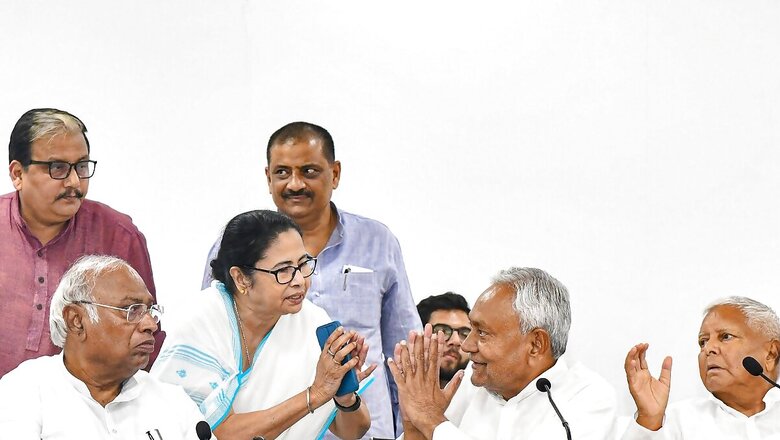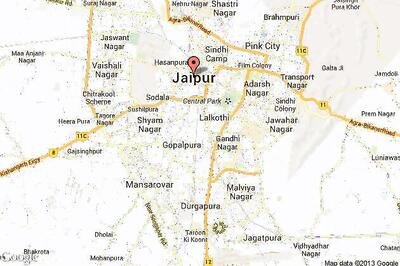
views
Hours after Nitish Kumar’s government in Bihar released the caste data yesterday, Rahul Gandhi reiterated Congress’ commitment to the contentious survey and defined his party’s “pledge” to bring “greater rights for greater population”.
Although caste census is being seen as the biggest poll plank for the Congress and its gung-ho INDIA bloc, Mamata Banerjee’s Trinamool Congress (TMC) — one of the prime movers of the alliance – seems to be the thorn in the flesh.
Of the 28 political parties forming the INDIA bloc, Banerjee’s TMC is the only one that is opposed to the idea of having a caste census. For the TMC, it is only about securing its largest vote bank– Muslims.
TMC’s national general secretary Abhishek Banerjee, while addressing media in Delhi last evening, said his party leaders would discuss the issue and will take a call in the next meeting of the INDIA alliance.
Meanwhile, TMC MP Saugata Roy said Mamata Banerjee always stayed away from any politics that divides people. “Mamata Banerjee never talked about caste, and West Bengal as a state has largely stayed away from caste divide. It has been a caste neutral state. However, the issues of caste census are still being discussed but Mamata Banerjee will take the final call.”
It is yet to be seen if the parties will use the Bihar survey to deepen the caste faultlines to win an election or bring social justice. But the exercise in Bihar is surely being seen as a prequel to the caste surveys in other Congress-run states, and a pre-cursor to a national caste census in the future.
With the “85: 15” (85% being ‘Others’ and 15% being upper caste Hindus) politics over the caste ratios of Other Backward Class, Extremely Backward Caste (EBC), Scheduled Caste (SC), Scheduled Tribe (ST) on one hand, and the general caste on the other, let’s see what it means for Prime Minister Narendra Modi, Mamata Banerjee and other Opposition parties, including the Congress.
Religion Above Caste
Modi and Mamata Banerjee’s politics on their respective turf has been identical, with religion always being the pivot and caste playing limited roles.
For Modi’s BJP, caste is almost a deal-breaker but politics of religion — primarily Hindu vs Muslim – pans out best on the national canvas. For the saffron party, castes only work in some parts of north India where Rajputs, Jats and Gurjars have dominance.
In fact, the conflict between two upper castes in Uttar Pradesh – the Brahmins and Rajputs — became a tough challenge for the parties to handle before the assembly elections. The caste arrangements, however, during ticket distribution is nothing similar to having a caste census.
The BJP never wants its Hindu votes to get fragmented on caste lines. The Hindu-Muslim polarisation works well for them. They would rather try to break the Muslim consolidation by taking some of its backward groups and sub-groups out of the block voting system. This is why, the Pasmanda Muslims’ (the backward group within the community) politics emerged before the elections.
The scenario is almost similar for Mamata Banerjee in West Bengal. She has added the majority of Muslim sub-groups to the OBC list. According to the National Commission for Backward Classes, West Bengal’s OBC list of 179 groups include 118 Muslim groups. A senior leader in Congress said “Didi objected to the caste census saying it wold hurt her Muslim vote bank”.
According to the OBC list available with the West Bengal Commission For Backward Classes, there are 171 communities in the groups, which include group A and B. Of the 80 communities listed under A category, 72 are Muslims. Under B category, 43 of 91 groups are Muslims. The categorisation is meant for the access to welfare schemes and other reservations. For instance, Mamata Banerjee announced a monthly financial assistance of Rs 500 to women of general category and Rs 1,000 for those of the SC, ST and OBC communities.
Caste Neutral Bengal?
Depending on the social indices and other parameters, a caste census might hurt Muslims in West Bengal. In fact, the politics in the state has superficially been caste neutral. However, the state cabinets across governments – the Left and Trinamool — always consisted of majority upper caste men and women, mostly Brahmins. An OBC or an SC/ST minister is brought as a representation of the communities, not on the normal course.
Caste calculations entered the mainstream politics in West Bengal with the advent of the BJP as a political force post 2016. For the BJP, calculations were creating its own vote bank among the Hindus as the consolidation of Hindu votes was never possible in West Bengal. BJP created its own constituencies of caste and region-based communities, which include Matua, Rajbanshi, Kurmis and so on. It was an idea to have splintered groups among Hindus.
Following BJP’s political calculation, Mamata Banerjee started catering to different caste groups through different policies. But the 30% votes of the Muslim community still remain the mainstay of the TMC in West Bengal.
Fresh Momentum for Congress
For Congress, caste census is another political play. India has seen its last caste census taking place in 1931. The country and its successive governments have used the colonial data as the marker for SC, ST, OBC reservation. Over the past 80 years and more, Congress never mooted the idea of caste census. However, Rahul Gandhi’s enthusiasm for the survey will give its policies a fresh momentum.
Analysts told News 18 that caste census may bring political dividend to the Congress, if used wisely. It may give the party a chance to break the stranglehold of the BJP over the Hindu votes, at least in some Hindi-heartland states where caste is still a burning issue and a pain point for many. States such as Uttar Pradesh, Rajasthan, Punjab, Haryana and Bihar, where the caste fault lines are deep, Congress may see positive changes with caste-specific policies.
Interestingly, the caste survey report in Bihar has also brought OBCs at the fore.


















Comments
0 comment